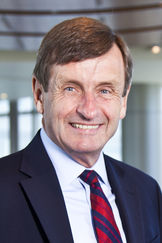Notre Dame alumnus James Curran, MD, MPH, Dean of the Rollins School of Public Health at Emory University and endowed chair in public health, has recently joined the Eck Institute for Global Health’s Master of Science in Global Health Advisory Committee. Curran graduated from Notre Dame in 1966, received a medical degree from University of Michigan, and then moved on to Harvard University where he received a Master of Public Health.

Curran was a pioneer in the emergence of the AIDS epidemic. He was stationed at the Centers for Disease Control and Prevention where he coordinated a task force in the early discovery of the global disease. While there he attained the rank of assistant surgeon general. Curran is a fellow of the American Epidemiologic Society, the American College of Preventive Medicine, and the Infectious Diseases Society of America. Author or co-author of more than 275 scholarly publications, he was elected to the Institute of Medicine of the National Academy of Sciences in 1993. He was given the Surgeon General's Medal of Excellence in 1996 and the John Snow Award from the American Public Health Association in 2003. Curran is an Adjunct Professor of Medicine and Nursing and Co-Director and Principal Investigator of the Emory Center for AIDS Research. He is immediate past chair of the board on Population Health and Public Health Practice of the Institute of Medicine and served on the Executive Committee of the Association of Schools of Public Health.
Curran joins four other accomplished international experts in global health who serve on the global health advisory committee:
David Gaus ’84, MD, who is most notably known in Notre Dame circles as the co-founder, of Andean Health and Development (AHD). Gaus, with the late Fr. Theodore M. Hesburgh, CSC, started AHD to provide self-sustainable, comprehensive health care in poor, rural areas of Latin America. Their pilot project was to build a hospital in the rural community of Pedro Vicente Maldonado. It opened in 2000, and in 2007, the hospital was 100% financially self-sustainable. He is also Assistant Clinical Professor of Medicine at the University of Wisconsin. Gaus received a Bachelor of Arts in Accounting from Notre Dame then earned his medical degree and master’s in public health and tropical Medicine from Tulane University and his residence at University of Wisconsin Family Practice at St. Luke’s Hospital.
Marissa Scalia Sucosky received her Master’s in Public Health in Health Policy from the Rollins School of Public Health at Emory University in 2003 while Curran was Dean. She is a Program Officer in the Office of the Director, National Center for Chronic Disease Prevention and Health Promotion, and an Epidemiologist in the Lead Poisoning Prevention Branch, National Center for Environmental Health, both at the Centers for Disease Control and Prevention, Atlanta, Georgia.
Vanessa Tobin is the Senior Technical Adviser for Water Supply, Sanitation and Water Resources Development for Catholic Relief Services, based in Baltimore, Maryland. Tobin previously worked for UNICEF for 24 years. She earned her Bachelor of Science degree in Civil Engineering from Birmingham University, United Kingdom, followed by a Master of Science degree in Public Health from the London School of Hygiene and Tropical Medicine. She earned her second Master’s degree in Public Administration from the John F. Kennedy School of Government, Harvard University. Tobin has worked in various management and technical capacities, serving in the Philippines, Egypt, Nepal, Pakistan, the United Kingdom, South Sudan, and Lesotho.
Steve Werner works with international nonprofit organizations that primarily focus on WASH programs (safe drinking water, sanitation and hygiene education) in developing countries. Werner and his clients work mainly in Africa, Asia, and Latin America in remote, under-served areas. He has worked in international development for 25 years with CARE International, Habitat for Humanity International, and Water For People. His career motivation started as a Peace Corps volunteer in South Korea. He is a Kellogg National Leadership Fellow, Salzburg Fellow, Rotarian, and a past president of the National Council of Returned Peace Corps Volunteers.
The Eck Institute for Global Health Advisory Committee serves to provide guidance to faculty and staff of the Master of Science in Global Health program. The committee offers insights related mainly to the program curriculum to ensure that it aligns well with global health needs in the marketplace. The Advisory Committee consists of professionals in the global health field who have experience with transnational organizations, governmental organizations, non-governmental organizations, and educational institutions. In addition, Advisory Committee members provide guidance on career opportunities, potential field sites, and research and training opportunities for current students and alumni of the program.
The Master of Science in Global Health program is a 12-month graduate program. Two semesters are spent on campus with course work that prepares the student for a six- to eight-week field research experience. Students will serve abroad in a resource-poor location and upon returning from their experience, each student submits and presents a capstone project. This scholarly work includes original or literature-based research by which they connect classroom science-centric training, survey research, and mathematical modeling to the field via hands-on experience.
The Eck Institute for Global Health recognizes health as a fundamental human right and endeavors to promote research, training, and service to advance health standards for all people, especially people in low-and middle-income countries, who are disproportionately impacted by preventable diseases.
Contact: Sarah Craig at Craig.20@nd.edu or call 574-631-2665